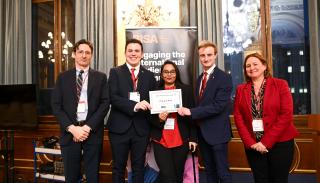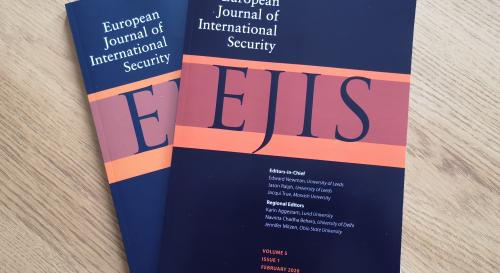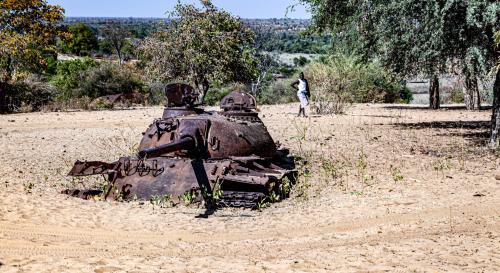
Breadcrumbs navigation
BISA/FCDO Model NATO 2023 – Over 100 students from 30 universities
On Friday 3 March approximately 120 participants from 30 UK universities took part in the annual BISA Model NATO. The event is run in partnership with the Foreign Commonwealth and Development Office (FCDO) and took place and their offices in London. This was the largest and most diverse run of the event to date, having started with 15 universities in 2019.
The event began with a warm welcome from BISA President and NATO specialist, Professor Mark Webber (University of Birmingham), and representatives from FCDO – who were also available throughout the day to chat with students interested in a career in the Civil Service. Working through facsimiles of two specialised NATO bodies – the Military Committee and the Civil Emergency Planning Committee – the students then had to agree a detailed set of actions to be endorsed in a final declaration by a simulated North Atlantic Council, NATO’s highest authority.
Each student had been given a NATO nation to represent, and had done research into their country’s resources and political positions prior to the Model. They had also been given two briefings on the disaster at hand. This year’s hypothetical scenario focused on multiple earthquakes and a volcanic eruption, resulting in significant loss of life and mass displacement of populations.
Mark Webber said:
“The simulation is designed to provide students with experience of crisis decision-making; to get them into the heads of people having to make tough choices in very testing circumstances. The students rose to this challenge very well. The Model concluded with a declaration agreed by all the student delegates on how NATO should respond to a major natural disaster. The students performed just like seasoned diplomats.”
The Model was a great success and extremely well received by the participating students. Comfort Ilozobhie, a participant from the University of Westminster said:
“The first words that come to mind when looking back at my experience during Model NATO are intellectually stimulating. It challenged me to make decisions and gave me a deeper insight into NATO diplomacy. Model NATO definitely improved my networking/diplomacy skills, especially in unmoderated Caucasus, as we had limited time to make alliances with other nations. It has also allowed me to build upon my public speaking skills as there were many debates that we had to get involved in.”
Ali Hasyer, a participant from Coventry University said:
“It was an incredible event. To have been able to see the grand halls and Locarno suite at the FCDO was inspiring. It was a stimulating event where compromises and negotiations took place to offer an action plan for our crises. As an IR student, it has given me insight into how diplomacy within NATO works and how it navigates crises.”
To conclude the event, several awards were presented to delegates by BISA Director Juliet Dryden.
The winners were:
Outstanding Delegation: Norway (Liverpool Hope University)
Distinguished Delegation: Canada (Bournemouth University)
Outstanding Delegate in the North Atlantic Council: Denmark (Strathclyde)
Distinguished Delegate in the North Atlantic Council: Czechia (University of Surrey)
Outstanding Delegate in the Military Committee: Albania (University of Stirling)
Distinguished Delegate in the Military Committee: France (Exeter University)
Outstanding Delegate in the Civil Emergency Planning Committee: The Netherlands (Newcastle University)
Distinguished Delegate in the Civil Emergency Planning Committee: Greece (University of Leeds)
All students receive a commemorative certificate for their participation in the event.
Find out more about what took place on the day, and what the participants took from the experience by watching this short video from University of Surrey student William Hitt. You can also read an interview with student participants Jenna Carty (Stirling) and Cezar-Deniz Celik (Coventry).


